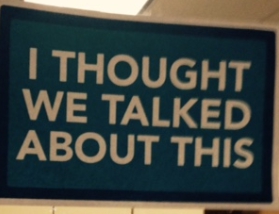
Managing Conflict
March 14, 2015Understanding the Problem Before You Decide on the Solution
March 15, 2015These thoughts come from Unlocking Generational Codes, by Anna Liotta: excerpted from pages 126, 127-131, 155-157
“Companies that want to hire and retain top talent need to get up to speed with the goals and preferences of Gen Xers and Millenials while not letting the viewpoints of Baby Boomers stop the technology’s progress and the company’s future. The days of loyalty to company are gone, so companies must understand what their employees want, set clear expectations of employees’ job duties, and live up to their promises from day one if they do not want to spend extra time, money, and energy on recruiting, only to lose employees.
Following World War II, G.I.s returned from the front and instituted the leadership training and organizational foundation learned in the trenches. Today, many legacy terms and philosophies such as: chain-of-command leadership, officers of the company, all hands meetings, decisions “above my pay grade,” and lockstep compensation plans still influence the thinking and expectations of high-level management.
For most of history, generations have been separated in the workplace due to the hierarchical system inherited from the military leadership and experiences of the G.I/Veteran generation. Work peers entering the workforce were predominately close in age and generational perspectives.
Today, a leader must adapt his style according to the Generational CODES of the people he is leading. Traditionalists and Boomers are still stunned to be taking orders from someone half their age whom they quietly mutter is still wet behind the ears.
It goes all the way to the top as evidenced in a June 27, 2011 Newsweek interview with retiring Pentagon boss Robert Gates when he said, “Hillary [Clinton] and I call ourselves the Old Folks Caucus… And I must say, it’s the first time in my life I’ve worked for a president who was 20 years younger than I was.”
Traditionalists: Traditionalists believed in the promises of big institutions and organizations. The golden horizon was that one day you would have the seniority, and then it would be your turn to be the boss, call the shots, lead the troops. In the meantime, you gave your best, and waited with the expectation that eventually, the best would be returned to you.
For Traditionalists a “healthy” fear of the boss/commanding officer was considered wise. It was understood that moving forward was directly correlated to staying on the boss’s good side and making the boss look good. Traditionalists obeyed the chain of command and “dug in” to their place in the organization’s hierarchy. They followed the rules of the day and became “company men,” and for the most part, their expectations were met.
Times have changed.
Baby Boomers: Baby Boomers flooded the workforce with high hopes for the world and even higher expectations of changing the way work was done. With their secure childhood during the rise of productivity and growth in the High social mood behind them, young Boomers entered the workforce ready to challenge the authority and question “the man.” As young adults of the Consciousness Revolution, Boomers advocated turning the traditional corporate hierarchy upside down.
Although Boomers may not like to remember it this way, they were considered very difficult to manage, and their entry into the workforce was not met with huge upticks in productivity. Why? They were arguing with everyone about everything, and if they weren’t happy about how they were being treated, they encouraged their peers to argue as well.
G.I. and Traditionalist bosses saw their questioning and challenging attitudes as rude, entitled, difficult to manage, and oh yes, lacking in strong work ethic. Sound familiar?
Boomers were genuinely passionate about bringing fun and spirit into the workplace, but the reality fell a little short of the big goal. While Boomers read, talked, and shared their ideas and theories of egalitarian leadership and participative management, with 80 million peers/competitors, Baby Boomers quickly began learning the rules of the game and how to work the system. Non-Boomers who work for a Boomer boss will tell you that their boss’s career habits, formed from working for command-and-control Traditionalists and G.I.s, are often still very much in evidence.
Gen Xers: With the boom of the 1970s ending with the bust of the ’80s recession, Gen Xers watched their parents scrape and scrap to climb the corporate ladder while hating their bosses, leaders, and jobs, but still basing their self-worth on the awards and recognition delivered by those same people and institutions. Xers saw their parent(s) work twenty-hour days and give up “quality time” with their family to work late and impress the boss.
Xers’ innocence was stripped away when hard times hit and their parents were cut loose without warning in the prevailing economic recession winds of “down-sizing and right-sizing” for the company’s benefit.
Consequently, Xers are suspicious of all “corporate speak.” While prior generations believed in the companies that made social contracts with employees, such as, “You work hard for us and we’ll take care of you,” Xers know firsthand that the corporate vision, mission, and values are generally only aspirational at best, and more accurately, would be found under the genre of science-fiction or fantasy.
Xers feel like they are in a never-ending search to find a (work)place to call home and leaders whom they can trust and believe. Along with broken promises in the workplace, Xers experienced up close the moral bankruptcy of leaders at every level of private and public institutions.
Observing the first Presidential resignation in US history just as they were beginning to become politically aware fundamentally shaped their belief in the lack of sanctity in public servants. From Exxon spills to Enron chills, Xers may have hoped for the best, but their core survivor mentality kept telling them to prepare for the worst just when they thought it was “safe to get back in the water.” (Duh dunt, Duh Dunt – Imagine scary Jaws music playing in the background, Xers do.)
Millenials: Millenials respect authority, but they do not fear it. Millenials had formative years filled with fans, friends, coaches, cheerleaders, and BFFs (Best Friend Forever). With Boomer parents wearing the BFF status as a medal of accomplishment, Millenials were encouraged to call their parents by their first names from birth and their grandparents by nicknames (Nana, Pop Pop). Consequently, Millenials have a very casual relationship with elders and authority figures.
Parents knew what they should do, but the threat of their children not liking them, or making a public scene was enough to dissuade them from pushing the issue. From the time they were in diapers to texting at the dinner table, Millenials prevailed every time they challenged their Boomer parents. Boomers’ commitment to being “liked” by their children meant removing the implementation of penalties or consequences for disobeying the leader/parent.
No longer do we have the unquestioning, follow-the-rules Traditionalists in charge; now authoritarians are on trial. Boomer parents have organized the PTA into a significant political entity to fight collectively and individually on behalf of their Millenials when authoritative figures, such as teachers, attempt to discipline or punish their children.
OLD MODEL NEW MODEL
Manager Coach
Superior Peer
Boss Partner
…
Expectations for what defines a work environment have undergone a radical transformation. A key question that today’s top talent is asking when considering a new workplace is, “Will I thrive here?” It’s no longer acceptable merely to survive your company, harassing boss, or jerk co-worker. Today’s top talent wants your organization’s environment to be a place where they will flourish and grow their skills.
Traditionalists didn’t believe work was supposed to be the place you go to be happy, find fulfillment, and express your personality or life purpose. A Traditionalist says, “Work is called “WORK” for a reason. Work is a serious place you go to get a real day’s work done.”
In the 1930s and 1940s, work environment laughter on the job was a disciplinary offense. You could be sacked at the Henry Ford Motor Plant for smiling or whistling on the job. (Whistle while you work was a Disney-invented fantasy.)
Boomers entered the workforce desiring an egalitarian environment that allowed for a free flow of ideas and opinions, a Utopia. However, their formative experiences of competing for every opportunity with their Boomer peers quickly transformed each job, bid, and client opportunity into a game full of politics and intrigue to be won at all costs.
Xers entered the workplace with great trepidation, and today, they are viewing the demand that they move into higher levels of management with the same caution. For Xers, moving up the “ladder” means becoming the enforcer of environmental protocol and policies they don’t believe in. Xers find navigating the political waters and intricate relationship mazes of the Baby Boomers exhausting and unfulfilling. They are creating their own work environments that include: “No Jerk Policies” and “Results-Only Work Environments” (ROWE).
At the other end of the spectrum, the core of a Millenial’s definition of work is: “Work is a personally fulfilling experience of creating a solution from wherever I am most productive.” For Millenials, work is a state of self-expression. It’s not a place where you go to do something; it’s what you do from wherever you are. They are looking for fun, friendly, and fast-paced environments that facilitate collaboration and rapid advancement.
—
While leaders know the cost of talent-turnover is high, they often ignore the hard truth that it’s frequently a problem they create. Today’s talent expects to see fulfilled the “promised” company values and culture sold to them in the “romancing” interview stage of the courtship to stand up over time.
Xers and Millenials are clear that they spend the majority of their waking hours in their professional organization’s environment. Whether or not they tell you so, top talent joins you on a trial basis all the while withholding judgment on how long they will stay. The ninety-day trial period is now a double-sided decision. If the answer to their questions of thrive or survive is, “No, I will not thrive here,” then they will begin looking, quietly, for a place where they will. Your investment of time, resources, and talent to attract the best and the brightest is wasted when you quickly lose them because they were sold on an environment the company couldn’t or wouldn’t provide.”
In order to thrive with all 4 generations working together, everyone has to be “All In” accepting some core beliefs:
1) Individual Behaviors like Listening to Understand, not to find a place to speak.
2) Organizational processes that everyone understands and supports.
3) Decision Competency – decisions get made at the right time.
4) Everyone is passionate to support the ongoing mission and works hard together to deliver desired outcomes.
Collaborative culture is the only way this will work.





